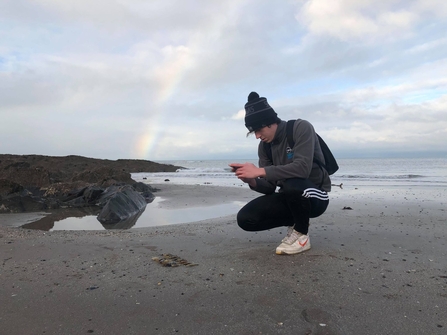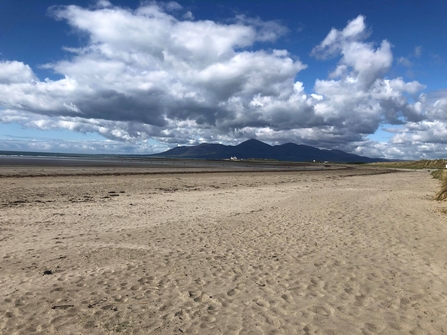Certain Elasmobranch (Sharks and skates) species that reside in Northern Irish waters are oviparous – this means they reproduce by laying eggs! During breeding seasons, females will lay their egg cases in the sea, usually in shallow water. The pup will develop within the egg case nourishing on a yolk sac, before hatching once fully formed. The pup will swim away leaving behind an empty egg case capsule. This capsule can be carried by tides and wash up onto shorelines around Northern Ireland.
The Seadeep team carry out regular beach surveys, searching the seaweed along the shoreline, and attempting to find as many egg cases as possible! Each species can be easily identified due to various morphological (physical) differences between them. Collecting egg cases allows for a better understanding of species presence at a certain location, therefore searching different shorelines gives a good idea of distribution of sharks and skates around our coastlines! Egg case data can help protect endangered species as well. Some of our shark and skate species are endangered (including the critically endangered Flapper skate), mainly as a result of historic overfishing. Gathering egg case data can help us understand what species are in our waters and can even indicate potential breeding grounds! With this knowledge, we can designate MPA’s (Marine Protected Areas), which will be managed to prohibit threats to these species and allow populations to recover.

As a placement student, egg case surveys have been some of my fondest memories from the project. A particular highlight was my first egg case find in Portaferry which I discovered underneath washed-up fishing equipment! Whilst on some surveys we find no egg cases, other surveys have been a great success! A recent survey carried out at Groomsport beach, after heavy rain, brought back over 30 small-spotted catshark egg cases! Personally, my favorite area to survey has been the North Coast. I have been able to find rarer egg cases, such as two Blonde ray egg cases! The Blonde ray is one of our rarer species, with only 16 previous records, so this was an excellent find! I have also enjoyed the public events (the few that have gone ahead due to restrictions!) They are a great way to help out the Seadeep team and get involved in the project!

Participation will increase your knowledge of local shark and skate species, and you’ll get to call yourself a citizen Scientist! With the easing of COVID-19 restrictions, public events will be becoming more regular so keep your eyes peeled on the Sea deep events page to ensure you get booked on! Beach surveys can also be solo adventures! All that is needed is yourself and a keen eye for egg case hunting! Simply walking up and down a local shoreline while keeping a look-out for any egg cases is a great start – the seadeep website offers great material to help identify your findings (Egg Case ID Guide) as well as videos to show correct surveying technique. There is also a fun egg case hunt game to get competitive against your friends or family! It is also important to look at tide times – 2 hours either side of low tide is the best time to go as the beach will be most exposed, giving you more room to hunt! Unfortunately, I forgot to check times on one of my first surveys and was greeted by no beach at all! Remember to record your findings on the Sea deep Website! Good luck!

